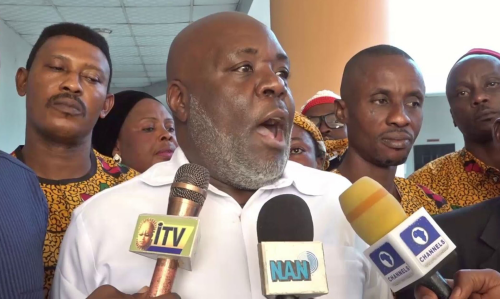Headlines
Court Clears APGA Chairman, Edozie Njoku Of Forgery Allegations.

In a significant legal victory, Justice Mohammed Madugu of the High Court of the Federal Capital Territory in Bwari has ruled in favour of Edozie Njoku, the National Chairman of the All Progressives Grand Alliance (APGA). The court has dismissed all forgery allegations made against him by the Nigeria Police.
The police had accused Njoku and APGA’s youth leader, Chukwuemeka Nwoga, of conspiring to alter a Supreme Court judgment initially delivered by Justice Mary Peter Odili (retired).
Discover related topics:
NJC Plans to Confirm New Supreme Court Justices, Submits Nominees to President Tinubu
Legal Challenge Against Tinubu’s Presidency Heads to Supreme Court

In his judgment on Tuesday, Justice Madugu rejected all 14 counts brought against Njoku, clearing him of the charges. The court held that due to “lack of sufficient and credible evidence, the prosecution has failed woefully to prove its case against the defendants.
“I find the 1st defendant, Chief Edozie Njoku, and the 2nd defendant, Chukwuma Nwoga, not guilty as charged, and therefore they have been discharged and acquitted.”

The defence counsel had urged the court to discharge and acquit the defendants, asserting that the police had failed to meet the burden of proof placed on them by law.
The court adopted the issue formulated by the defence counsel to determine whether the prosecution had proven its case against the defendants beyond reasonable doubt. According to section 138 of the Evidence Act, the court noted that the prosecution is expected to prove its case beyond a reasonable doubt.
Justice Madugu, in his judgment, stated that “it is crystal clear that internal disputes in APGA had played a significant role in causing the complexity of the case.”
In the 1st count, the court noted that being an allegation of criminal conspiracy, it must be proven by the prosecution with circumstantial evidence. However, the court held that the prosecution witness did not produce evidence linking the defendants with an agreement or conspiracy to commit the alleged offence.
“In accordance with section 178 of the penal code, the prosecution did not establish any dishonest intent following the letter Njoku wrote to Justice Mary Peter Odilli, retired.”
Published with clearance from the court ruling.



Click Button Below to Join Our Telegram Groups

For Advert Inquiries & News/Article Publishing
Call:+2348033888791, +2347069999005
E-mail: legalattorneyblog01@gmail.com









